Related Research Articles

Vitaly Mikhaylovich Zholobov is a retired Soviet cosmonaut who flew on Soyuz 21 space flight as the flight engineer, and a former head of Kherson Regional Council in Ukraine.

The Communist Party of Ukraine is a banned political party in Ukraine. It was founded in 1993 as the successor to the Soviet-era Communist Party of Ukraine, which had been banned in 1991. The party has been a member of the Moscow-based Union of Communist Parties – Communist Party of the Soviet Union since its establishment in 1993 as an umbrella organisation for all communist parties of the former Soviet Union.

Sergey Vladilenovich Kiriyenko is a Russian politician who has served as First Deputy Chief of Staff of the Presidential Administration of Russia since 5 October 2016. Previously he served as the 30th Prime Minister of Russia from 23 March to 23 August 1998 under President Boris Yeltsin. Between 2005 and 2016 he was the head of Rosatom, the state nuclear energy corporation. Kiriyenko was the youngest Prime Minister of Russia, taking the position at age 35.
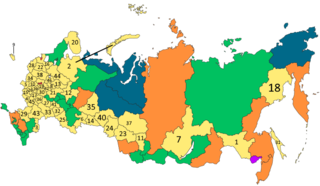
An oblast is a type of federal subject in Russia.

Kherson is a port city of Ukraine that serves as the administrative centre of Kherson Oblast. Located on the Black Sea and on the Dnieper River, Kherson is the home of a major ship-building industry and is a regional economic centre. It has a population of 279,131

The Odesa Soviet Republic was a short-lived Soviet republic formed on 30 January [O.S. 17 January] 1918 from parts of the Kherson and Bessarabia Governorates of the former Russian Empire.
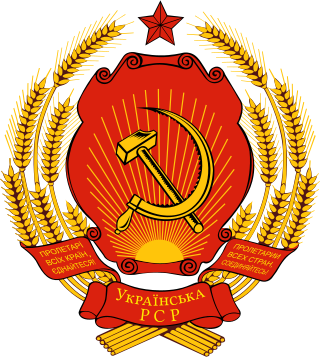
The Communist Party of Ukraine was the founding and ruling political party of the Ukrainian SSR operated as a republican branch of the Communist Party of the Soviet Union (CPSU).
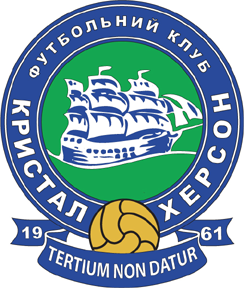
Krystal Kherson is a professional football club from Kherson in Ukraine that has a long history in the Soviet and then the Ukrainian Leagues. As of the 2020–21 season, it will play in the Ukrainian First League, the second tier of Ukrainian football, following promotion from the 2019–20 Ukrainian Second League.

During its existence from 1919 to 1991, the Ukrainian Soviet Socialist Republic consisted of many administrative divisions. Itself part of the highly centralized Soviet Union, sub-national divisions in the Ukrainian SSR were subordinate to higher executive authorities and derived their power from them. Throughout the Ukrainian SSR's history, other national subdivisions were established in the republic, including guberniyas and okrugs, before finally being reorganized into their present structure as oblasts. At the time of the Ukrainian SSR's independence from the Soviet Union, the country was composed of 25 oblasts (provinces) and two cities with special status, Kiev, the capital, and Sevastopol, respectively.
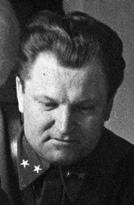
Aleksey Illarionovich Kirichenko was a Soviet Ukrainian politician, who was the first ethnic Ukrainian to head the republic's communist party during the Soviet era. Between 1957 and 1960, he was a Secretary of the Central Committee of the Communist Party of the Soviet Union and the second-highest-ranking official within the party after Nikita Khrushchev.

Novorossiya or New Russia, also referred to as the Union of People's Republics was a project of a confederation of the self-proclaimed Donetsk People's Republic (DPR) and the Luhansk People's Republic (LPR) in Eastern Ukraine, both of which were under the control of pro-Russian separatists at the time.
The Kherson Regional Committee of the Communist Party of Ukraine, commonly referred to as the Kherson CPU obkom, was the position of highest authority in the Kherson Oblast, in the Ukrainian SSR of the Soviet Union. The position was created in April 1944, and abolished in August 1991. The First Secretary was a de facto appointed position usually by the Central Committee of the Communist Party of Ukraine or the First Secretary of the Communist Party of Ukraine.

Novorossiya, literally "New Russia", is a historical name, used during the era of the Russian Empire for an administrative area that would later become the southern mainland of Ukraine: the region immediately north of the Black Sea and Crimea. The province fell largely within a slightly wider area known in Ukrainian as the Stepovyna "Steppe Land", or Nyz "Lower Land". The name Novorossiya entered official usage in 1764, after the Russian Empire conquered the Crimean Khanate, and annexed its territories, when Novorossiya Governorate was founded. Official usage of the name ceased after 1917, when the entire area was incorporated in the Ukrainian People's Republic.

Hero City of Ukraine is a Ukrainian honorary title awarded for outstanding heroism during the 2022 Russian invasion of Ukraine. It was awarded to ten cities in March 2022, in addition to four already-named Hero Cities of the Soviet Union. This symbolic distinction for a city corresponds to the distinction of Hero of Ukraine awarded to individuals.
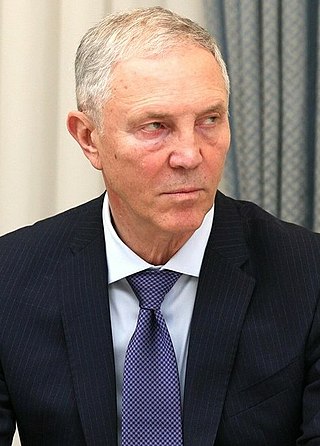
Vladimir Vasilyevich Saldo is a Ukrainian-born Russian politician serving as the head of the collaborationist Kherson military–civilian administration in Russian-occupied Ukraine since 26 April 2022.

Kirill Sergeyevich Stremousov was a Ukrainian collaborationist politician and blogger who served as the deputy head of the Kherson military–civilian administration in Russian-occupied Ukraine from 26 April 2022 until his death on 9 November 2022, just before Russia ordered a retreat from Kherson.

The uprising of Nykyfor Hryhoriv was an armed protest against the Bolshevik rule in Ukraine in May 1919, which covered the area between Mykolaiv and Kherson, Katerynoslav, Cherkasy, Kremenchuk and Kryvyi Rih. Its leader was otaman Nykyfor Hryhoriv, who gathered around him guerrilla troops of peasants rebelling against food requisitions and repression led by the Cheka.

Oleksiy Valeriyovych Zhuravko was a Ukrainian and Russian politician who was a member of Ukraine's national parliament Verkhovna Rada from 2006 to 2012. He was a member of the pro-Russian Party of Regions from 2006. Zhuravko moved to Russia in 2015. He acquired Russian citizenship and joined the United Russia party in July 2022. He died in September 2022 in a missile attack in Kherson during the Ukrainian southern counteroffensive.
This is a list article about flags that have been used by pro-Russian separatists in Ukraine and in areas occupied by Russia and Russian-controlled forces during the Russo-Ukrainian War.
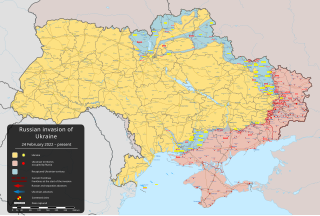
Below is a topical outline of articles significantly or meaningfully related the Russo-Ukrainian War; it is not an outline of articles related generally to Russian–Ukrainian relations. The Related outlines section contains links to other outlines related to the Russo-Ukrainian War. This outline is a topical organization of articles; for a chronological organization, please see the Timelines section below.
References
- ↑ Hamolsky, L. Simply lilac bloomed... . "Dnepr Vecherniy" newspaper. 30 January 2012
- ↑ "Накануне Нового года ушел из жизни Андрей Гиренко". kherson.net.ua (in Russian). 2 January 2018. Retrieved 2018-01-30.